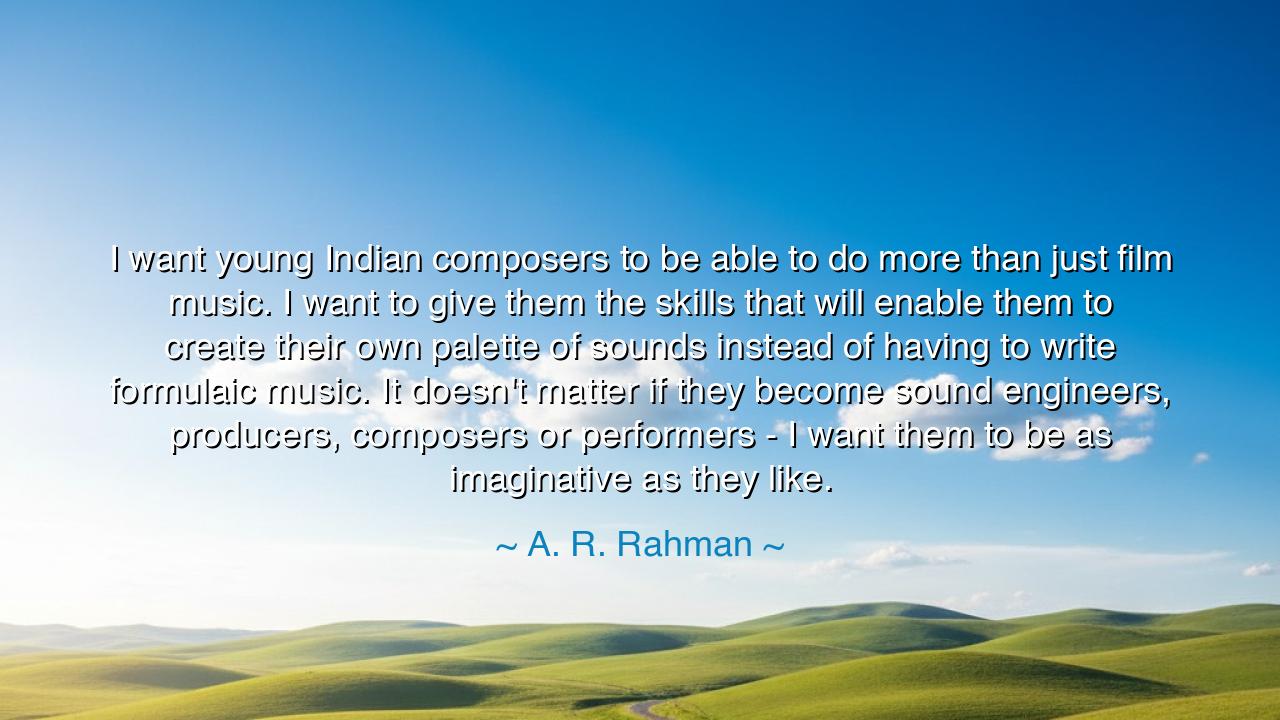
I want young Indian composers to be able to do more than just
I want young Indian composers to be able to do more than just film music. I want to give them the skills that will enable them to create their own palette of sounds instead of having to write formulaic music. It doesn't matter if they become sound engineers, producers, composers or performers - I want them to be as imaginative as they like.






A. R. Rahman, the maestro of sound whose music has touched souls across the world, once declared: “I want young Indian composers to be able to do more than just film music. I want to give them the skills that will enable them to create their own palette of sounds instead of having to write formulaic music. It doesn’t matter if they become sound engineers, producers, composers, or performers—I want them to be as imaginative as they like.” In these words we hear not only the voice of a musician, but of a mentor, a visionary, one who looks beyond his own legacy toward the future of a people’s creativity.
The ancients often spoke of the teacher as one greater even than the warrior. For the warrior defends the present, but the teacher shapes the future. Rahman, standing upon the summit of his global success, could have chosen to rest in his laurels, content with his fame. Yet his heart turned instead toward the rising generation. He saw that the wealth of Indian music was vast and radiant, yet too often confined within the chains of formulaic demands—melodies bent to the will of commerce rather than the spirit of imagination. And so he proclaimed a different path: freedom through knowledge, mastery through skills, and liberation through art.
Think of Ravi Shankar, who carried the sitar from the sacred traditions of India into the heart of the Western world. When he played at Monterey Pop Festival in 1967, he shattered boundaries, showing that Indian music was not a niche, but a universal voice. In the same way, Rahman calls upon young composers not to confine themselves to one form, one marketplace, one demand, but to cultivate their own palette of sounds—a spectrum as wide as the human spirit itself. For it is only in daring to imagine beyond the familiar that true greatness emerges.
The origin of Rahman’s words lies in his own journey. He himself began as a composer for films, yet he never limited his vision to formulas. He blended Carnatic and Hindustani traditions with electronic textures, Western harmonies with Tamil folk, Sufi mysticism with global rhythms. He shook the walls of convention, and the world responded. His Oscar-winning score for Slumdog Millionaire was not merely entertainment—it was a revelation of how Indian sound could embrace the world without losing its soul. His desire now is to pass this spirit of fearless creation to the young, that they too may rise beyond boundaries.
The meaning is clear: to be a creator is not to copy, but to invent. Formulaic music may please for a moment, but it does not endure. What endures is the boldness to bring forth something new, to combine the old and the new into a living, breathing art. And Rahman calls upon the youth of India not to shrink into safe patterns, but to explore the vast, uncharted terrain of sound itself. To be a composer, a producer, a performer, is not merely to follow—but to imagine.
The lesson for all generations is this: do not let tradition become a cage, nor commerce become your master. Honor the roots of your art, but do not let them bind your branches. Cultivate your skills until they are sharp and strong, then wield them with courage to create a world of your own making. Just as Rahman sought to build schools and academies to train the next wave of artists, so too must we seek out knowledge, discipline, and freedom, that our own creations might shine with authenticity.
Therefore, let each young soul remember: your craft is a vessel, and you are the navigator. Do not let the winds of formulaic demand carry you where you do not wish to go. Instead, take the helm, chart your own course, and fill your sails with the wind of imagination. For only then will you add something truly new to the eternal symphony of humanity.
Thus Rahman’s words endure as both guidance and prophecy: the future of Indian composers—and of all creators—lies not in repetition, but in invention; not in formulas, but in freedom. The world waits for those who will dare to shake the snow globe of tradition and let it explode into something never seen before. To such as these, the future belongs.






AAdministratorAdministrator
Welcome, honored guests. Please leave a comment, we will respond soon